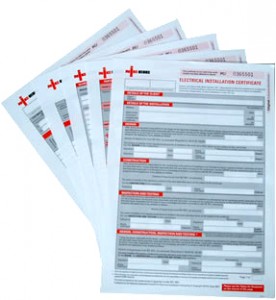 Air Intelligence carries out fixed wire testing, but are you confused around what it is and if you need it carried out. Hope fully this will help:
Air Intelligence carries out fixed wire testing, but are you confused around what it is and if you need it carried out. Hope fully this will help:
What is Fixed Wire Testing?
Fixed wiring Electrical Testing (also referred to as Periodic Testing) is an important inspection of your building’s electrical wiring structure and maintenance. It highlights any potential problems you may not be aware of. As well as piece of mind, tests take place to meet the legal requirements of the Electricity at Work Regulations Act 1989, Health & Safety at Work Act 1974 and BS 7671 (IEE Wiring Regulations 17th Edition as amended).
Fixed wire installation testing involves the testing of electrical services and systems that conduct electricity around a building. It covers all of the hard wiring in a building and includes items such as main panels, distribution boards, lighting, socket outlets, air conditioning and other fixed plant. Fixed wire installation testing involves performing a sequence of rigorous visual inspections and electrical tests on all systems in the building.
Who is responsible for Fixed Wire Testing?
Realistically, everybody has a duty to ensure the safety of others whilst at work; however, the Duty Holder will have ultimate responsibility for electrical safety. If nobody at your place of work is clear on who that is, then the responsibility falls on the most senior person. It is important to know who has the responsibility for safety and welfare of staff in order to establish that compliance is achieved. There are many reasons not to do periodic electrical test and inspection such as cost, inconvenience or lack of knowledge. However none of these reasons will be accepted as a defence in the event that an accident or fire occurs. Aside from the threat of prosecution in the event of injury or death, surely the safety of your colleagues, employees, visitors or belongings are reason enough to test and inspect electrical systems at work.
How much does Fixed Wire Testing Cost?
Well, it depends, but as an example, a typical property with up to 24 trips in the consumer unit would cost in the region of £420 (July 2015). Large premised can have hundreds of circuits, hence the cost will increase, but the cost per circuit will reduce.
What are the intervals between Fixed Wire Testing?
The table below provides guidance on the frequency of formal inspections of electrical installations as well as routine checks.
| Type of Installation | Routine check | Maximum period between
inspections and testing as necessary |
|
| General installation | |||
| Domestic | N/A | change of occupancy/10 years | |
| Commercial | 1 year | change of occupancy/5 years | |
| Educational establishments | 6 months | 5 years | |
| Hospitals | 1 year | 5 years | |
| Industrial | 1 year | 3 years | |
| Residential accommodation | at change of occupancy/ 1 year | 5 years | |
| Offices | 1 year | 5 years | |
| Shops | 1 year | 5 years | |
| Laboratories | 1 year | 5 years | |
| Buildings open to the public | |||
| Cinemas | 1 year | 1-3 years | |
| Church installations | 1 year | 5 years (quinquenially) | |
| Leisure complexes | 4 months | 3 years | |
| Places of public entertainment | 1 year | 5 years | |
| Restaurants and hotels | 1 year | 5 years | |
| Theatres | 1 year | 3 years | |
| Public houses | 1 year | 5 years | |
| Village halls/Community centres | 1 year | 5 years | |
| External installations | |||
| Agricultural and horticultural | 1 year | 3 years | |
| Swimming pools | 4 months | 1 year | |
| Caravan parks | 6 months | 1 year | |
| Highway power supplies | as convenient | 6 years | |
| Marinas | 4 months | 1 year | |
| Fish farms | 4 months | 1 year | |
| Emergency lighting | daily/monthly | 3 years | |
| Fire alarms | daily/weekly/monthly | 1 year | |
| Laundrettes | 1 month | 1 year | |
| Petrol filling stations | 1 year | 1 year | |
| Construction site installations | 3 months | 3 months |




